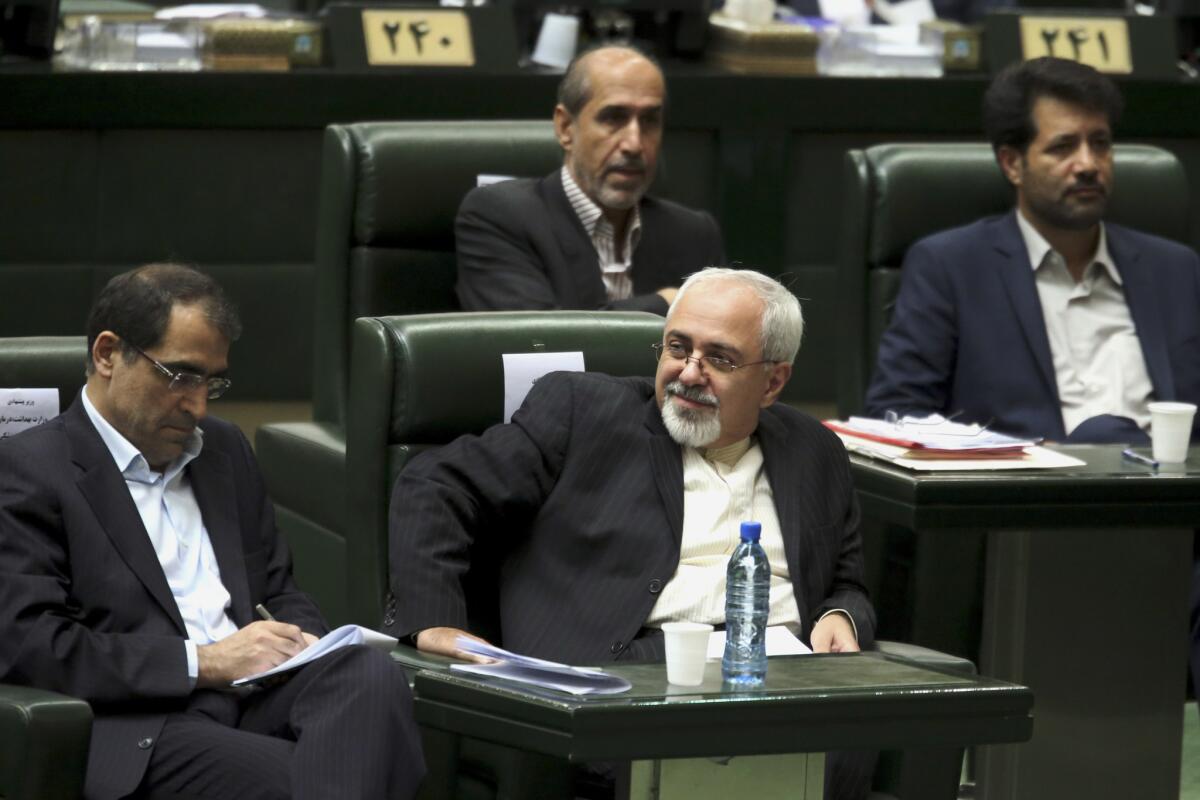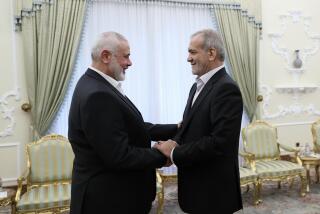Iran’s Rouhani outmaneuvering hard-liners on Syria, nuclear talks

TEHRAN -- Iranian President Hassan Rouhani appears to be outmaneuvering hard-liners with his move Thursday to take control of stalled nuclear negotiations and in curbing bombastic vows to defend ally Syria from threatened U.S. airstrikes.
In sharp contrast with the bellicose posturing of his predecessor, former President Mahmoud Ahmadinejad, Rouhani has kept expectations low in regard to Iran providing military aid to Syrian President Bashar Assad if Western forces attack him.
Another former president and influential backer of Rouhani, Ali Akbar Hashemi Rafsanjani, last week was reported to have publicly blamed Assad’s forces for alleged chemical weapons attacks Aug. 21 in Damascus suburbs that reportedly killed hundreds of civilians.
Reports that such banned weapons of mass destruction were used in the 2 1/2-year-old Syrian civil war have spurred international outrage and calls for punitive airstrikes to degrade Assad’s military capabilities.
In a clear signal of change under his month-old administration, Rouhani announced Thursday that his government had assumed responsibility for nuclear talks with the International Atomic Energy Agency in Vienna, which are set to resume Sept. 27 after a five-month hiatus. The negotiations, stalemated for years by Iranian foreign policy hard-liners loyal to supreme leader Ayatollah Ali Khamenei, were previously under the control of the religious hierarchy’s Supreme National Security Council.
Numerous meetings between IAEA officials and Iran’s former chief nuclear negotiator, Khamenei advisor Saeed Jalili, failed to make any progress during the Ahmadinejad regime. Nor did 10 sessions over the last 17 months between Jalili and six major world powers, including the U.S., move Tehran any closer to agreeing to stop enriching uranium to levels suitable for weapons production.
Renouncing high-level enrichment and any nuclear military ambitions are key conditions set down by those six nations -- which also include Russia, China, Britain, France and Germany -- for easing sanctions on Iran that have crippled its economy.
Analysts hailed the shift of the nuclear talks from Khamenei’s religious leadership to Rouhani’s government as an opportunity for the new president to make good on his campaign pledge to improve relations with the West.
“A U-turn in Iranian diplomacy occurred today,” said Saeed Laylaz, an economist and political analyst close to the reform-minded Rafsanjani. “This is very important, as we understand it to mean that the supreme leader [Khamenei] is allowing the Foreign Ministry to handle the nuclear talks.... We can see a new chapter has already opened vis-a-vis relations with the West.”
Laylaz also pointed to Rouhani’s modest pledge to support Syria with humanitarian aid if Assad’s forces come under attack for the alleged chemical weapons use.
If Syria is targeted with Western airstrikes, “the Islamic Republic of Iran will do its religious and humanitarian duty and send food and medicine,” Rouhani on Wednesday told the Assembly of Experts, a panel of Islamic theologians that chooses and advises the supreme leader.
“Iran will not do anything to openly announce assistance to the Syrian regime if Syria is attacked by the United States,” said Nader Karimi Joni, an independent analyst and chief editor of the sociopolitical magazine Gozaresh. He and Laylaz interpreted Rouhani’s reserved offer of support as following through on campaign promises to give priority to Iranians’ desire for improved living conditions and an end to their international isolation.
The nuclear policy takeover “reinforces the message of Rouhani during the election that Iran is looking to turn around its relations with the world and that he appreciates that the only viable mechanism for doing that is re-engaging in the nuclear talks in a very different way than it has in the past eight years,” said Suzanne Maloney, a senior fellow at the Brookings Institution’s Saban Center for Middle East Policy.
“Moving the portfolio from the Supreme National Security Council to the Foreign Ministry certainly underscores Rouhani’s personal identification with the progress of the talks,” Maloney said. “They are now wholly invested in the executive branch, which may signal a willingness of Khamenei to tolerate a stronger presidency.”
However, she recalled, the supreme leader also granted some leeway to Ahmadinejad and Rafsanjani during their first terms as president, only to curtail their authority later.
Most important, Maloney said, the shift of responsibility for the nuclear issue has positioned a savvy and moderate figure, Foreign Minister Mohammad Javad Zarif, to deal with the IAEA and the major powers.
“This puts at the helm of the talks the Iranian who is best positioned to engage in serious and productive dialogue with Washington,” Maloney said of Zarif, a former ambassador to the United Nations who has spent much of his adult life in the United States.
Adding to the impression of Iran under Rouhani trying to defuse tensions with the West was the president’s reported holiday wishes to Jews around the world for a “blessed Rosh Hashanah.”
Rafsanjani, meanwhile, also departed from the previous Iranian leadership’s knee-jerk support for Syria with his accusation in a speech Saturday that Syrian civilians had been exposed to “chemical attack from their own government.”
The Iranian Labor News Agency, which first reported Rafsanjani’s comments, later revised the wording to remove the accusation that Assad’s forces were behind the attacks. Some news media controlled by conservatives, such as the Revolutionary Guards’ Javan daily, suggested that the video of Rafsanjani had been doctored.
Maloney said she had reviewed a tape of Rafsanjani’s address and was convinced it was genuine.
“But that doesn’t mean Iran is abandoning Assad or welcoming an American intervention,” she cautioned, citing reports that Revolutionary Guards are in Syria, as are Iranian-backed Hezbollah militiamen.
Iranian political and religious leaders have been hedging their support for the Assad government since the start of the civil war in March 2011, Maloney said, “and it is quite clear that there is no consensus in the Iranian leadership that Iran should be defending Assad.”
ALSO:
India ‘dowry deaths’ still rising despite modernization
Blast in Egypt injures more than 20; interior minister survives
Colombian president’s poll numbers sink amid strikes, other woes
Twitter: @cjwilliamslat
Special correspondent Mostaghim reported from Tehran and Times staff writer Williams from Los Angeles.
More to Read
Sign up for Essential California
The most important California stories and recommendations in your inbox every morning.
You may occasionally receive promotional content from the Los Angeles Times.











